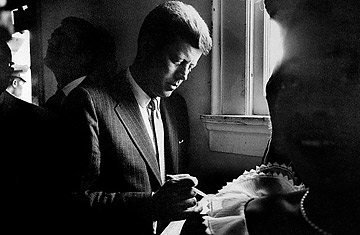
(3 of 7)
Washington's national-security apparatus had decided there was no living with Castro. During the final months of the Eisenhower Administration, the CIA started planning an invasion of the island, recruiting Cuban exiles who had fled the new regime. Agency officials assured the young President who inherited the invasion plan that it was a "slam dunk," in the words of a future CIA director contemplating another ill-fated U.S. invasion. J.F.K. had deep misgivings, but unwilling to overrule his senior intelligence officials so early in his Administration, he went fatefully ahead with the plan. The doomed Bay of Pigs invasion in April 1961 became the Kennedy Administration's first great trauma.
We now know—from the CIA's internal history of the Bay of Pigs, which was declassified in 2005—that agency officials realized their motley crew of invaders had no chance of victory unless they were reinforced by the U.S. military. But Allen Dulles and Richard Bissell, the top CIA officials, never disclosed this to J.F.K. They clearly thought the young President would cave in the heat of battle, that he would be forced to send in the Marines and Air Force to rescue the beleaguered exiles brigade after it was pinned down on the beaches by Castro's forces. But Kennedy—who was concerned about aggravating the U.S. image in Latin America as a Yanqui bully and also feared a Soviet countermove against West Berlin—had warned agency officials that he would not fully intervene. As the invasion quickly bogged down at the swampy landing site, J.F.K. stunned Dulles and Bissell by standing his ground and refusing to escalate the assault.
From that point on, the Kennedy presidency became a government at war with itself.
A bitter Dulles thought Kennedy had suffered a failure of nerve and observed that he was "surrounded by doubting Thomases and admirers of Castro." The Joint Chiefs also muttered darkly about the new President. General Lyman Lemnitzer, Chairman of the Joint Chiefs, said "pulling out the rug [on the invaders ]was... absolutely reprehensible, almost criminal." Admiral Arleigh Burke, the Navy chief, later fumed, "Mr. Kennedy was a very bad President... He permitted himself to jeopardize the nation."
Kennedy was equally outraged at his national-security advisers. While he famously took responsibility for the Bay of Pigs debacle in public, privately he lashed out at the Joint Chiefs and especially at the cia, threatening to "shatter [the agency] into a thousand pieces and scatter it to the winds." J.F.K. never followed through on this threat, but he did eventually fire Dulles, despite his stature as a legendary spymaster, as well as Bissell.
Weeks after the Cuba fiasco, J.F.K. was still steaming, recalled his friend Assistant Navy Secretary Paul (Red) Fay years later in his memoir, The Pleasure of His Company. "Nobody is going to force me to do anything I don't think is in the best interest of the country," the President told his friend, over a game of checkers at the Kennedy-family compound in Hyannis Port, Mass. "We're not going to plunge into an irresponsible action just because a fanatical fringe in this country puts so-called national pride above national reason. Do you think I'm going to carry on my conscience the responsibility for the wanton maiming and killing of children like our children we saw [playing] here this evening? Do you think I'm going to cause a nuclear exchange—for what? Because I was forced into doing something that I didn't think was proper and right? Well, if you or anybody else thinks I am, he's crazy."
This would become the major theme of the Kennedy presidency—J.F.K.'s strenuous efforts to keep the country at peace in the face of equally ardent pressures from Washington's warrior caste to go to war. Caught between the communist challenges in Laos, Berlin, Vietnam and Latin America and the bellicosity of his national-security élite, Kennedy again and again found a way to sidestep war. In each crisis, he improvised a strategy—combining rhetoric that was alternately tough and conciliatory with aggressive backdoor diplomacy—that found the way to a peaceful resolution.